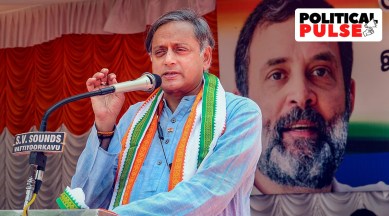Crony capitalism an issue but can’t be only issue for elections: Shashi Tharoor
Suggests that Congress identify issues that affect people directly, work on Opposition unity by sitting together and working out seats that can be won by respective parties

At a time when the Congress is aggressively attacking the government over what it calls Prime Minister Narendra Modi’s patronage of industrialist Gautam Adani, senior party leader and Lok Sabha MP Shashi Tharoor has said that “crony capitalism” and “corruption” cannot be the single issue of campaign for the party in the 2024 Lok Sabha elections.
He also suggested that Opposition unity can become real if the Congress and other parties sit together and go through each of the 543 constituencies of the Lok Sabha to find out “the most obvious non-BJP challenger in a particular seat” to avoid division in anti-BJP votes.
monthly limit of free stories.
with an Express account.
“Crony capitalism is a legitimate issue but it is not unfortunately, or otherwise, the principal issue in the minds of most voters. I think a common sense point that I would make to my own colleagues, if we were to have a discussion about this, is that the voters are most moved by things that affect their daily lives or their own feelings or emotions… including many people are moved by perceptions of injustice. Corruption charges, unless they can be very clearly proven, are less effective,” he said, at The Indian Express Idea Exchange session.
“Don’t forget, of course, that Rajiv Gandhi was brought down by Bofors in 1989, and that is something that has stayed in the minds of very many people: that, if indeed you can bring down one government by alleging a scam, perhaps another government can meet the same fate. I am not saying that the argument is not without any merit, but I am saying that for the most part… there are other arguments we need to add to this one. This can’t be the only issue in the election campaign .That is my personal view. But I have no authority and I am not speaking for the party on that matter,” he said.
Tharoor was replying to a question on whether it was a right strategy to make allegations of crony capitalism against the Modi government in the context of the Adani Group, the central theme of the Congress campaign in 2024, given that a similar corruption charge on the matter of the Rafale deal did not work in 2019.
Asked about Opposition unity and if the Congress could regain its pan-India strength, Tharoor said: “It’s widely seen that, of the 543 seats in Parliament, a little over 200 are seats which are a straight fight between the Congress and the BJP. There is no other party of which that is true. So therefore, by definition, the Congress is the principal opponent of the BJP. It’s the only pan-Indian opponent of the BJP.”
He pointed out that even when the Congress did badly in the 2019 Lok Sabha elections, the 52 seats it won were scattered throughout the country. “We had a presence everywhere, and we won elections everywhere. In the old days, we might have won 20 seats in a state, and this time we might have won just one or two in the same state. But at least we have that footprint everywhere in the country.”
Tharoor added: “So I would say that for the Congress to regain its national image, it simply has to make the point to the Opposition parties that we will give way to you in areas where you are clearly stronger than us, and you must give way to us where we are stronger. Inevitably, the Congress will fight far more seats than any of the Opposition parties, by far. The Opposition parties will also recognise that. Even those who have stayed away from the Congress know that there are a couple of hundred seats where the best they can do is be spoilers, they just can’t actually ever be credible challengers because they have no presence, no history, no workers, no cadres, no organisational capacity.”
So, he said, “sit down with the Opposition, literally go through the 543 constituencies with a pencil and see if you can come to a consensus — easily on 90 per cent and with more difficulty on the remaining 10 per cent — as to who is clearly the most obvious non-BJP challenger in a particular seat. If you do that, we might well find Opposition unity turning out to be a real prospect”.
To another question, he said Opposition parties should concentrate, first of all, on the economic conditions of people. “We need to ask people, has this government helped you in your lives? Is your life better off? Do you have a job? Do you have more income? Do you have anything good going for you? I suspect the answer would be not so great.”
Secondly, he said, “a lot of people, this may be partially just the urban elite, but a lot of people are perturbed about this dramatic and visible and audible erosion of our secularism”.
Thirdly, Tharoor said, “we do need, at least for the educated public, to talk about the erosion of institutional autonomy”.
“All of these are arguments well worth making. But we need to do it in a coherent way and we need to do it in a cooperative way. We need to stop undercutting each other in various states and places. We do recognise that a national election is actually also the sum total of 28 states elections. And therefore we can’t afford to just sit and expect all this to happen naturally. There has got to be a serious organisational effort,” he said.